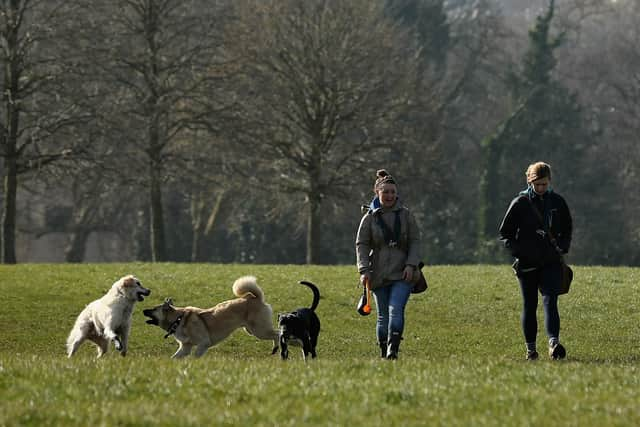Political parties need to stop putting women into silly categories with patronising nicknames – Susan Dalgety
Readers, if you’re an adult human female (aka a woman) and aged between 45 and 65 years old, then prepare yourself to be wooed by desperate politicians over the next few months. It seems that the major parties need our vote. After years of being ignored, even sneered at by young party activists who think the modern world started in 2000, we are suddenly in demand.
Party strategists have realised that women of a certain age vote and are now falling over each other to persuade us to their cause. Pollsters have long used customer personas, much beloved of advertisers, in an attempt to understand and target groups of voters. New Labour (remember them?) were keen to persuade ‘Mondeo Man’, described by Tony Blair as someone whose dad voted Labour. “He used to vote Labour, too. But he’d bought his own house now. He’d set up his own business. He was doing very nicely. His instincts were to get on in life,” explained Blair.
Advertisement
Hide AdAdvertisement
Hide AdIt emerged this week that the Lib Dems are particularly interested in ‘National Trusters’ – women who “spend their weekends walking in the countryside with their dogs”. That’s me off the hook then. My weekends are pretty much the same as my weekdays: some childcare, a bit of writing, a lot of cooking and Twitter.


Labour’s Shadow Secretary for Women, Anneliese Dodds, Aberdeen born and bred, has apparently turned her beady eye on the SWI – the long-standing women’s organisation with a reputation for great cakes, though apparently its 10,000 members now enjoy a bit of gin-tasting and a spot of belly dancing.
The people’s party is also keen on ‘working class’ middle-aged women. One Labour source told a national newspaper earlier this week that if anyone is going to sway the result of the next general election, it will be the ‘Take A Break-ers’. The anonymous briefer did not mean women with a Kit-Kat addiction. He (party sources are usually male) was referring to a magazine whose front page boasts such sensational stories as “I swapped bodies with a woman from the past” and “Mum hid secret triplets for six years”.
“We think it is a group that could change its vote… they’re probably not university educated, and they do over-represent in the sort of seats we need to win back,” said another ‘source’. Barbara Castle, he is not.
The Tories and the SNP are both polling badly at the moment, so they will be desperate to appeal to any voter, from 18 to 100 years old, male or female. The Conservatives are a lost cause, but if the beleaguered First Minister, whose first 100 days in power have been less than impressive, was to draw a line under his party’s ill-advised gender bill and turn his attention to the things that matter to women – like the economy and social care – he might just hold onto Livingston woman. Maybe.
That’s the lesson in women’s studies that political parties need to learn. Middle-aged women are not just for general elections, to be dropped as soon as the polls close. We are the backbone of this country. We provide the unpaid care that keeps our parents out of old people’s homes. We supply the unpaid childcare that allows our children to work, so that they can pay their unaffordable mortgage or rent. We are the women who earn £11 an hour working unsociable supermarket shifts to fit in with our other responsibilities. We are the middle managers who are rarely promoted, but without whose wisdom and expertise organisations would implode.
Some of us read Vogue, others don’t have time for such fripperies. Many didn’t get the chance to go to university, some have three degrees. I know women who spend every spare moment rowing across the Firth of Forth, others whose idea of bliss is a large glass of prosecco and Sex and the City (circa 1999). I have friends who are dyed-in-the-wool nationalists, others who are to the left of Jeremy Corbyn. Some change their vote every election. Others have never voted anything else but Conversative, and never will.
Women know better than anyone that the country is in a mess. That the NHS, 75 years old earlier this week, is at breaking point. We also understand that it needs more than extra investment, it needs wholesale reform. We worked out years ago that our economy is broken, damaged by low productivity, Brexit, and stagnant wages. We know with heart-breaking certainty that – unless we are property rich – our children and grandchildren face an unprecedented housing crisis. And we care about the environment, about human rights, about equality. We may not suffer fools gladly – we don’t have the time – but we are not the unattractive, bigoted misanthropes as caricatured by Generation X.
Advertisement
Hide AdAdvertisement
Hide AdAnd here’s the thing, women are 51 per cent of the population. We are the majority of eligible voters. As Professor Rosie Campbell, director of the Global Institute for Women’s Leadership at King's College London, argues, the average voter is a woman. Political parties don’t need to segment us into crude categories, with patronising nicknames, they just need to listen to us, the middle-aged women who have lived long enough to work out how things in this country work – or don’t.
We may not believe in unicorns anymore, but we do want a better society. If you want our vote, come and talk to us about how you will end the cost-of-living crisis, fix social care and grow the economy. We will listen, and then make up our mind, not based on which magazine we read, or how we spend our weekends, but on what we think is best for our country.
Comments
Want to join the conversation? Please or to comment on this article.